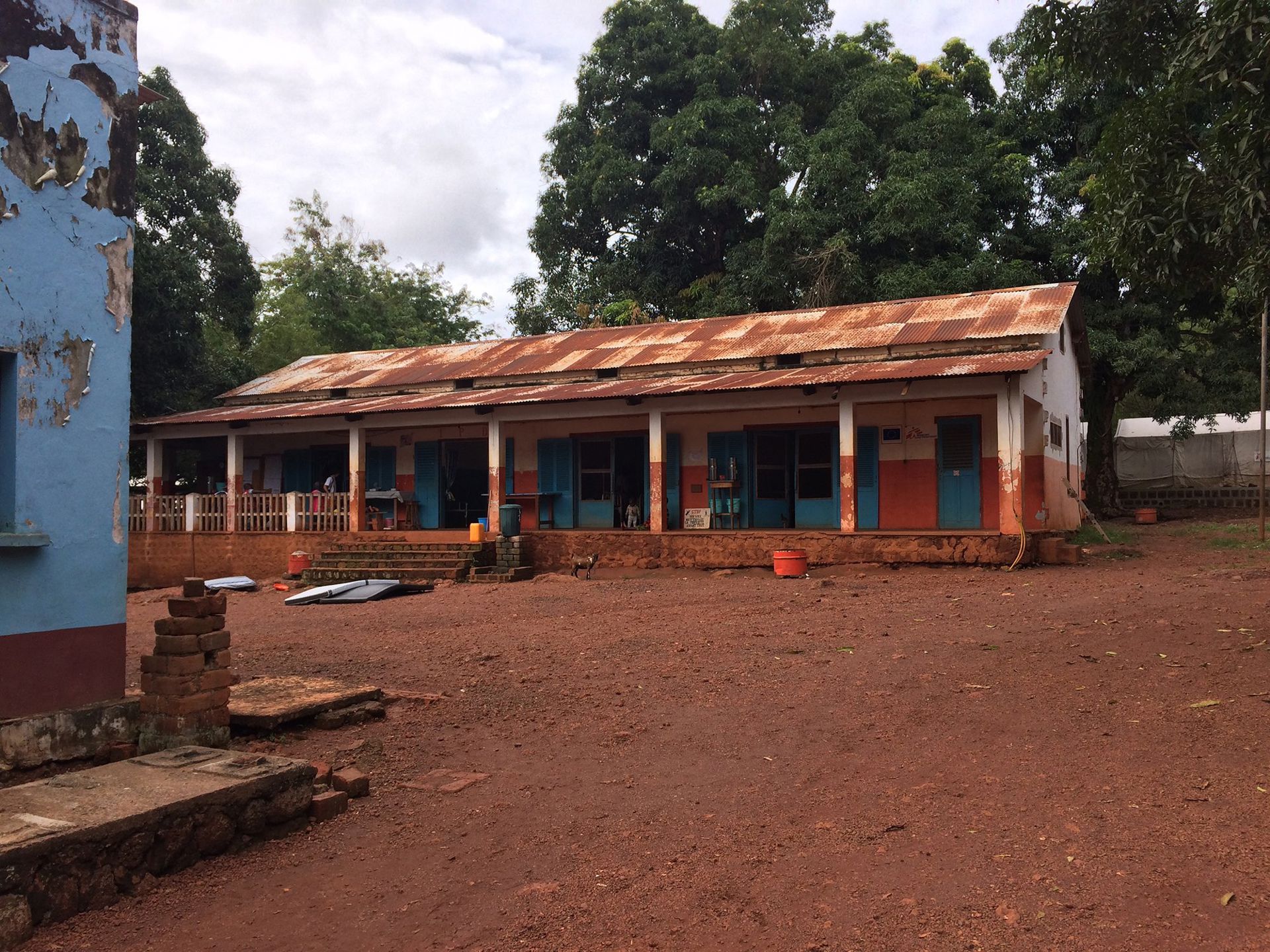Yemen has been in wars for years. A large number of people are being displaced by conflicts. With more than 376,000 displaced people among an estimated population of two million, Hajjah hosts more displaced people than any other Yemeni governorate. About a quarter of these are sheltering in Abs district, often living in remote areas without basic services so as to lessen the chance of being targeted by airstrikes or other types of violence associated with the conflict. However, Abs is now one of the areas in Yemen worst affected by cholera outbreak. Since Abs registered its first cholera case in late March, the number of cholera cases has exploded, with MSF’s cholera treatment centre in Abs town receiving as many as 462 patients in a single day – more than anywhere else in Yemen.
Even before the cholera outbreak, MSF teams in Abs rural hospital were seeing substantial increases in emergency consultations, paediatric admissions and surgical interventions. There have also been outbreaks of measles and whooping cough and peaks of malaria – all diseases that should be either limited or controlled. Together, these are a clear sign that Yemen’s health system, desperately short of resources and staff, has collapsed.
The five stories:
"There are no drugs. If you have money, you get treatment. Otherwise, you’ll die."
- Ayed Ali, caretaker
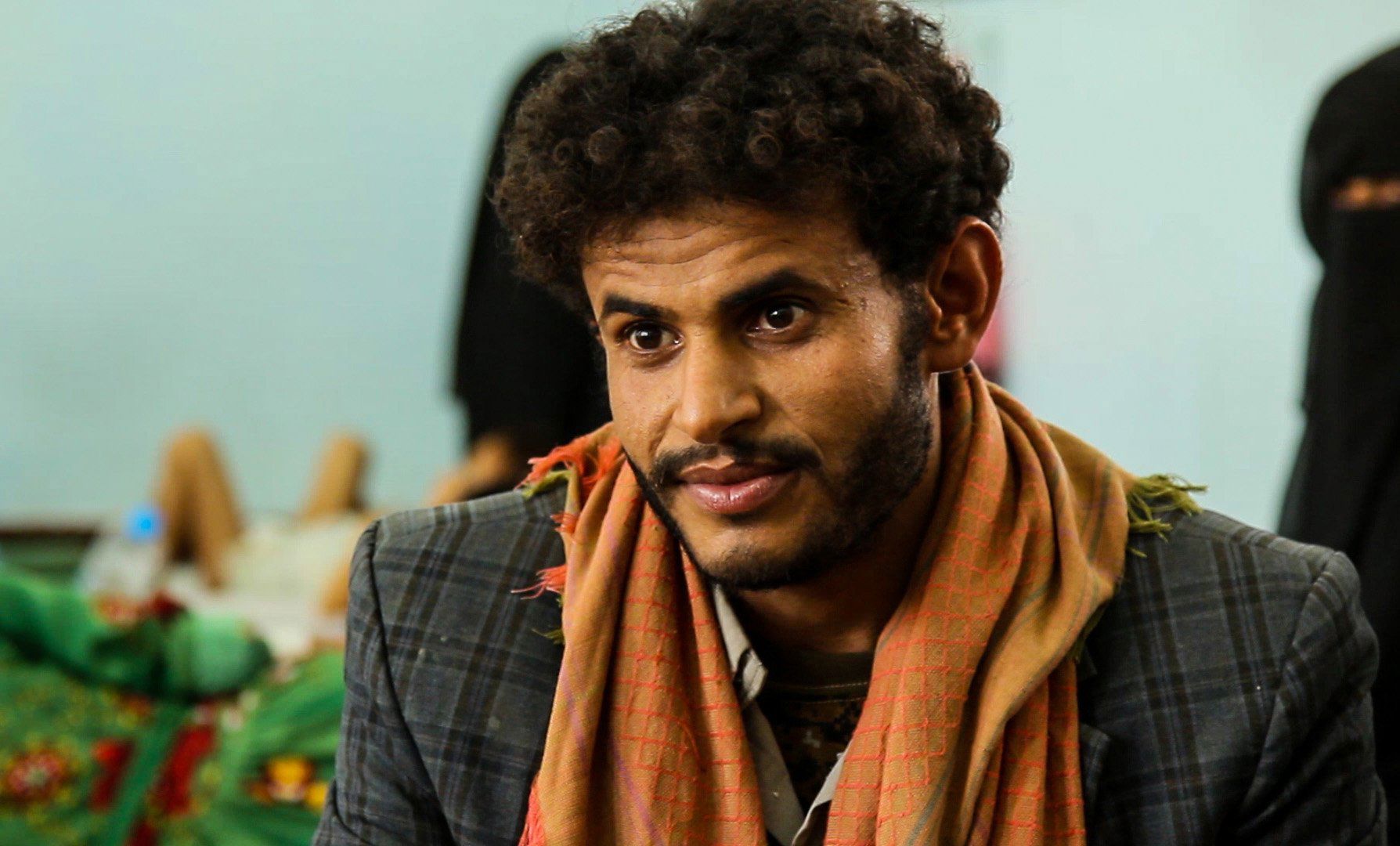
Ayed talked about the course of accompanying cholera patients to Abs hospital.
© MSF
I am from al-Sharq district (of Hajjah governorate). We live in simple houses. Many Yemeni people live in the countryside, drinking from exposed wells and tanks, no matter the water is clean or not. We discovered some cases of cholera in the morning, then more cases in the afternoon. By dawn, we had hospitalized these cases to the nearest public health center. But we found no services. We gave them painkillers up until 3 am, but their situation kept getting worse. We came to MSF when our situation required that we seek help. The infected family comprised 9 members. We were forced to look for an ambulance, because it costs a lot to get here.
I was living in Abs, but we were forced to leave our home. My house was damaged and destroyed because of the bombings, so I was forced to move and build another house. My life was settled. I lived a safe and secure life. I was an employee with a monthly salary, but now things are different. There are no salaries and no services. Even public hospitals are down. There are no drugs. If you have money, you get treatment. Otherwise, you’ll die. The humanitarian situation is different from one person to another. Some people are wealthy and can manage their affairs, other are poor. But still, the situation is bad for everyone.
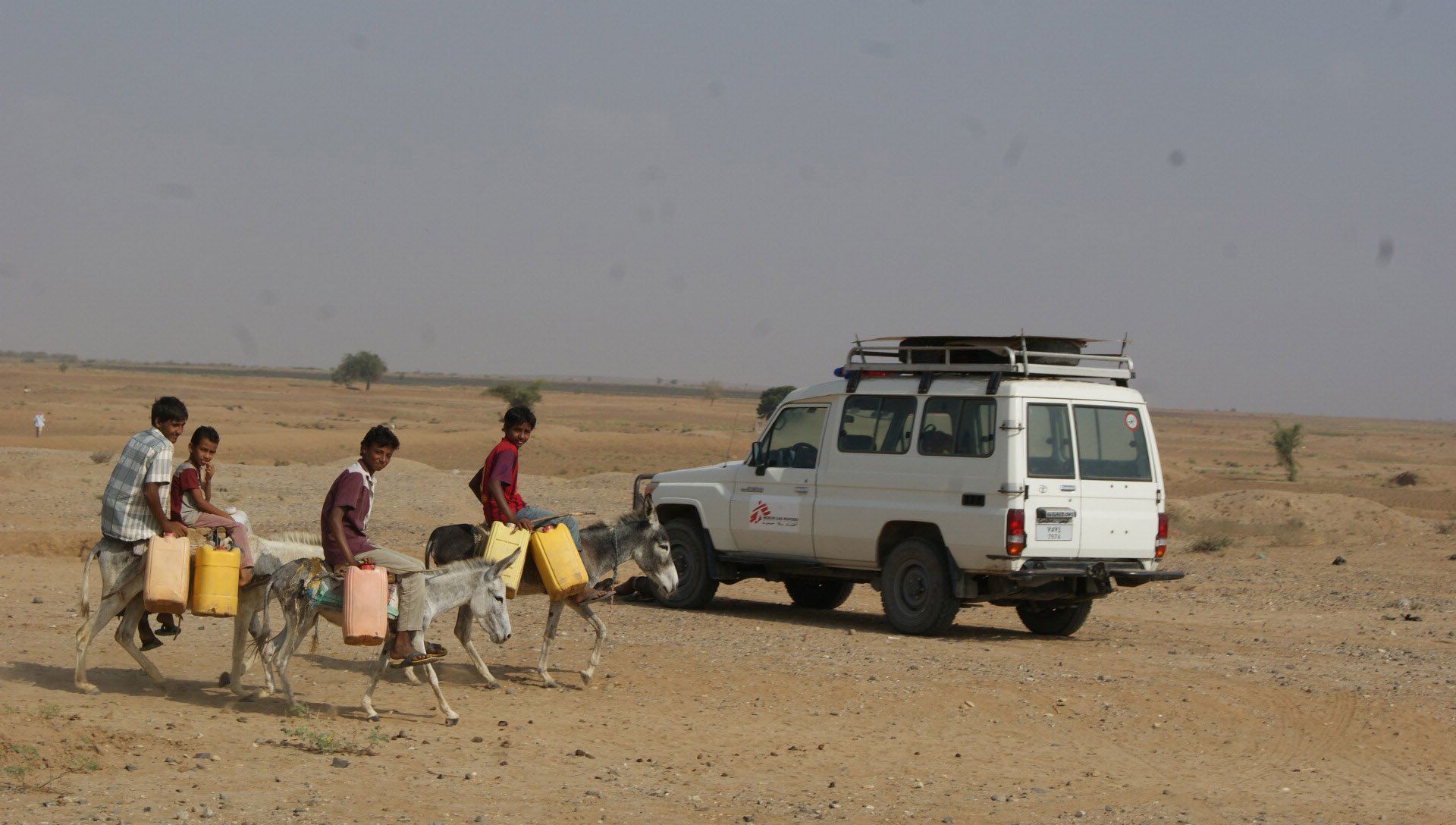
An MSF team on its way to a mobile clinic in Abs district, while four children on their donkeys go to fetch water. Water is one of the most pressing needs for displaced people, together with food, medication, shelter and protection.
Rain is considered to be a destabilising factor, as it floods tents and rudimentary houses. © Gonzalo Martínez / MSF
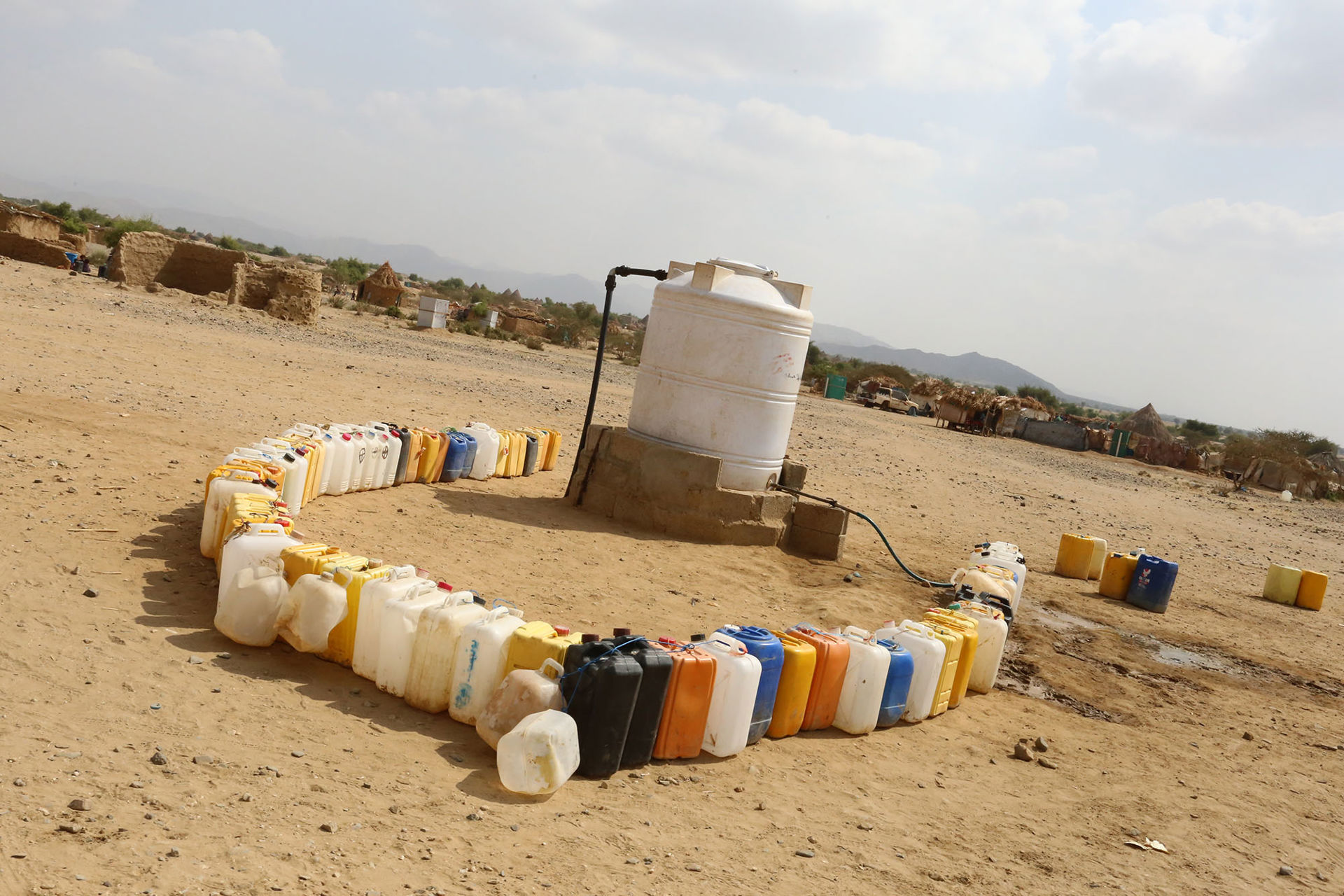
Water scarcity is one of the most serious problems in Yemen in general and Abs in particular. The situation in displacement settings is particularly worrying, utterly neglected and less resilient to external shocks. Sanitation is another critical issue, as many households do not have latrines nearby and open defecation is common. Poor hygienic conditions contribute to it being a breeding ground for epidemics such as the ongoing cholera and acute watery diarrhoea epidemic. © MSF
"I don’t feel safe......however, I’d never leave my country."
- Zahra Hussain, mother of two malnourished children
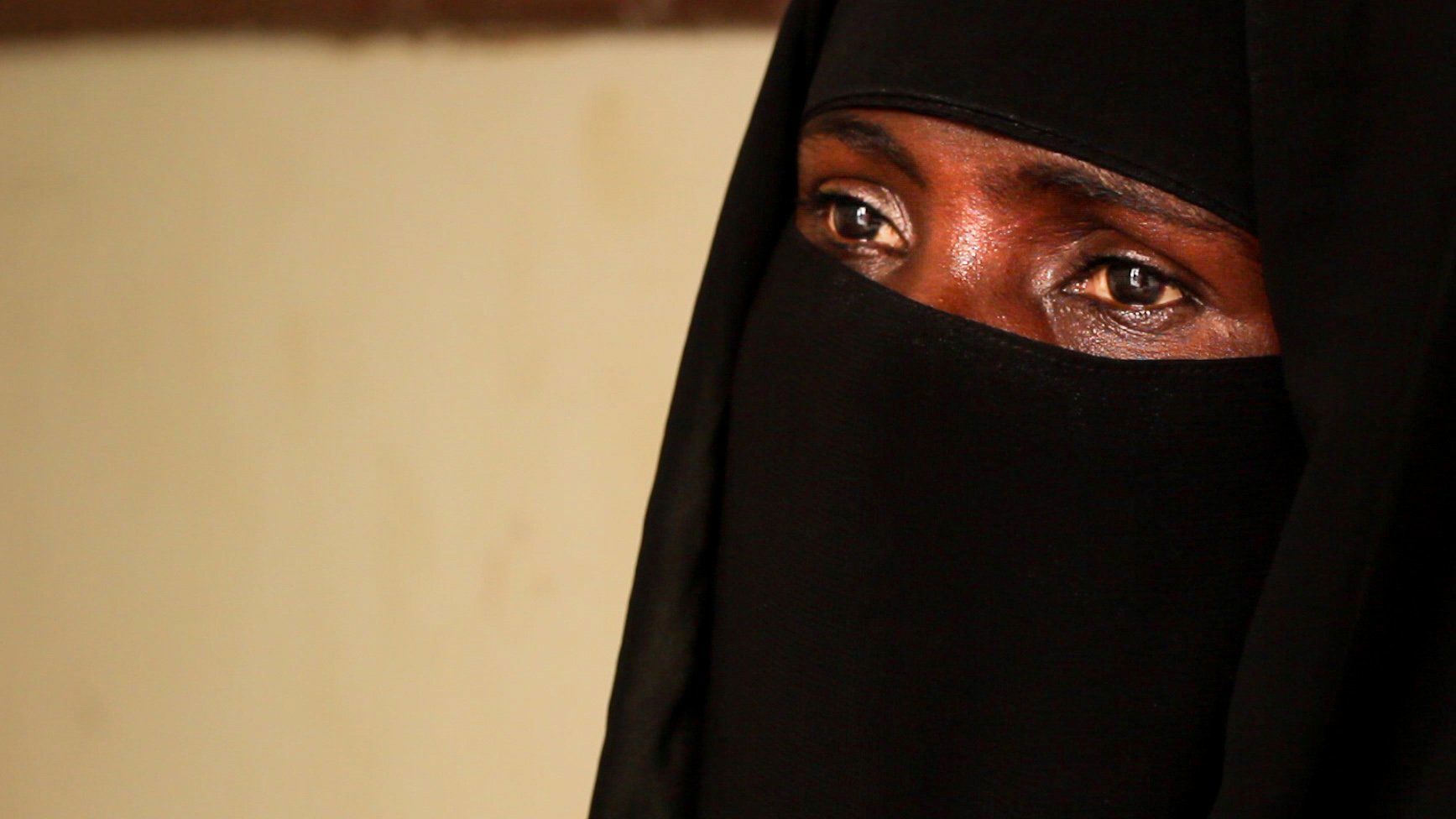
Zahra brought her two children to hospital to seek treatment. She said during wartime, it's hard just to get her children the milk they need. © MSF
I came here with my sick children and I could barely find transportation to get me here. Their father’s situation isn’t good either. He’s away working. A kind person with a car helped me get to the hospital. My children are in a rough shape. I have 4 there in Buhaira, our village. Life there is hard. I am still worried about them. Our life and area are not like before. Everything has become more difficult.
It was better and safer. People used to go to their work, shops were full and loaded, we used to go to the market, but now, it’s not the same. We don’t have health centers there to care for patients. We are finding trouble getting basic supplies. Everything is missing, like flour. My children were raised in the war. It’s even hard to get them the milk they need. I spend many days looking for milk, worried and anxious. I wish the war would end and our country will go back to how it was before. I don’t feel safe. I feel scared. It’s not like before, when you could go anywhere and still feel safe. However, I’d never leave my country. I don’t want to migrate.
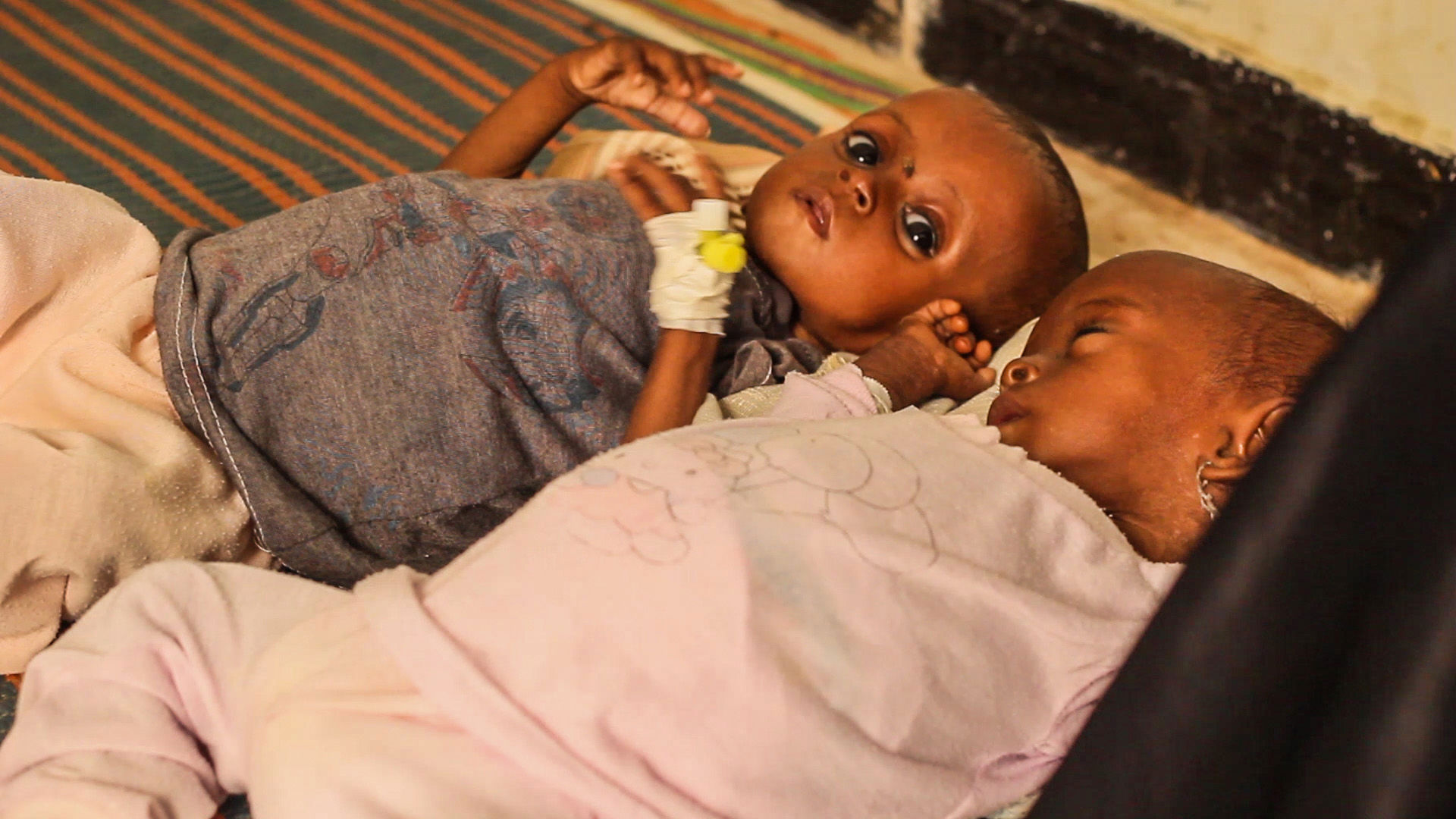
The babies of Zahra were malnurished and dehidrated. Once in hospital they were fed milk. © MSF
"Cholera is everywhere; the water is contaminated and I don’t drink it."
- Ali Muhammad, patient
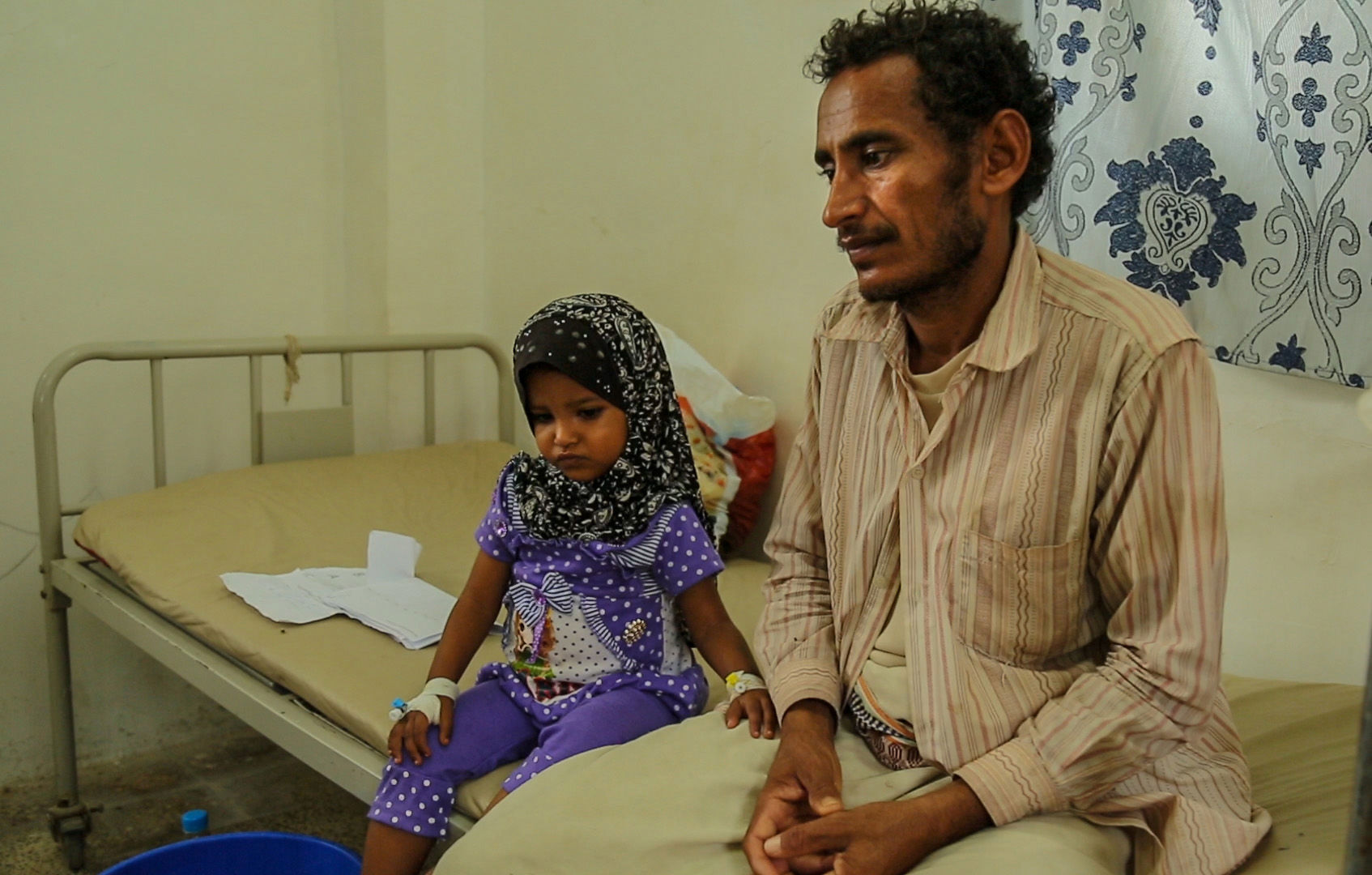
Ali and his family, who rely on qat harvest for living, have been terribly impacted by the war. © MSF
We harvest qat but I can barely sell it. I have six children. This girl (in the photo) has been sick for 3 months, because of the deteriorating circumstances. She’s stuck here in the hospital and nothing seems to be helping her improve. She’s suffering from anemia, infections, malaria. My family back home is sick too, with all kinds of illness. Everybody is sick and in rough shape, and their poor financial condition does not enable them to move from one health center to another.
Cholera is everywhere; the water is contaminated and I don’t drink it. We have tanks, but we don’t get water regularly. The situation cannot be worse. I cannot even provide for my own family. My brother has more than 8 children and he struggles to put food on the table even. I don’t have the money to pay for anything; even our clothes, rugs, and everything are the same all the time. We don’t even have doors. We have houses without doors, not to mention (the problems that this causes because of the) rain and coldness in the winter. My father got sick and although we hospitalized him, he passed away. My mother died as well. And I am just like many others.
"I feel that all the efforts and care did not go to waste. I love it when I see a child smile."
- Dr Ahmad Hasan Azman, a general practitioner in the nutrition department.
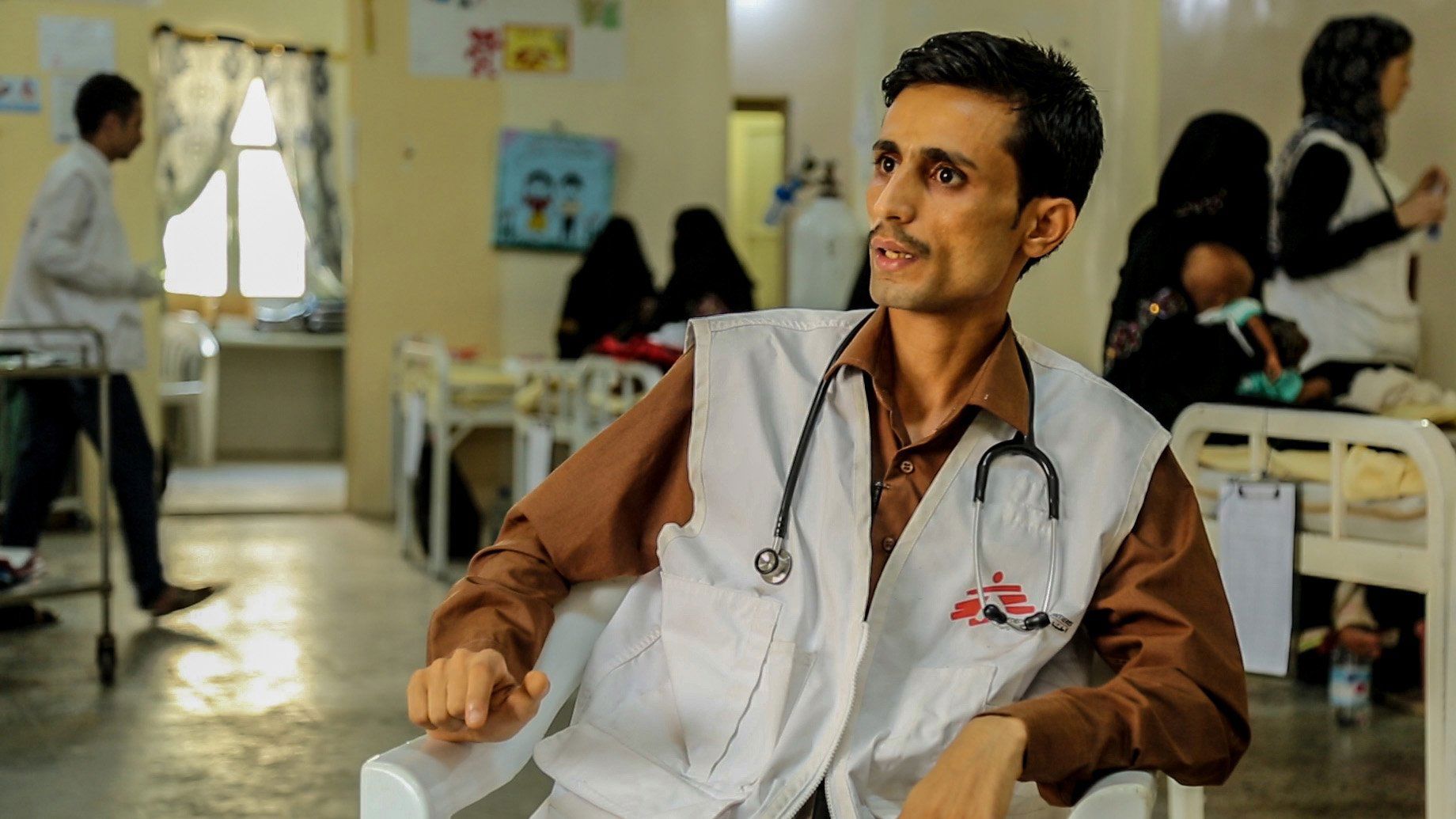
Dr. Azman points out that many of the patients are reluctant to stay in the hospital to complete the treatment, which makes them unable to recover. © MSF
I work with MSF since December 2016. People in this area rely on daily labor, unlike people living in the highlands, who can rely on qat cultivation. People in Abs are not highly-educated and they do not have savings or fixed jobs. The people of this area are the most affected. Due to the current crisis, these people have lost their livelihood and that’s why many of them come here to the hospital. We get a lot of very complicated cases; people in bad situations. When we ask the caretakers, they say that they did not have enough money to take the patient to a hospital. We’ve been struggling with the cases we receive, because they often arrive quite late; in a very advanced stage of illness. We receive patients from more than half of the governorate of Hajjah, not only the residents of Abs district. We receive a lot of internally displaced people.
We face problem in convincing some patients, especially their mothers, to keep their sons or daughters to stay in the inpatient therapeutic feeding centre and complete the entire treatment. Some of them stay just for a few days, then decide to leave. We try to inform them that the healing process requires that the patient go through the different phases and gain weight, but a lot choose to leave against medical advice. They return 2 – 3 weeks later with the same complications and diseases due to neglect and poor personal hygiene that can cause diarrhea. War has been impactful. At least, I feel that all the efforts and care did not go to waste. I love it when I see a child smile.

These mobile clinics provide out-patient services for internally displaced people and host communities across the district, including regular consultations, emergency referrals, ante-natal care and mental health. © MSF
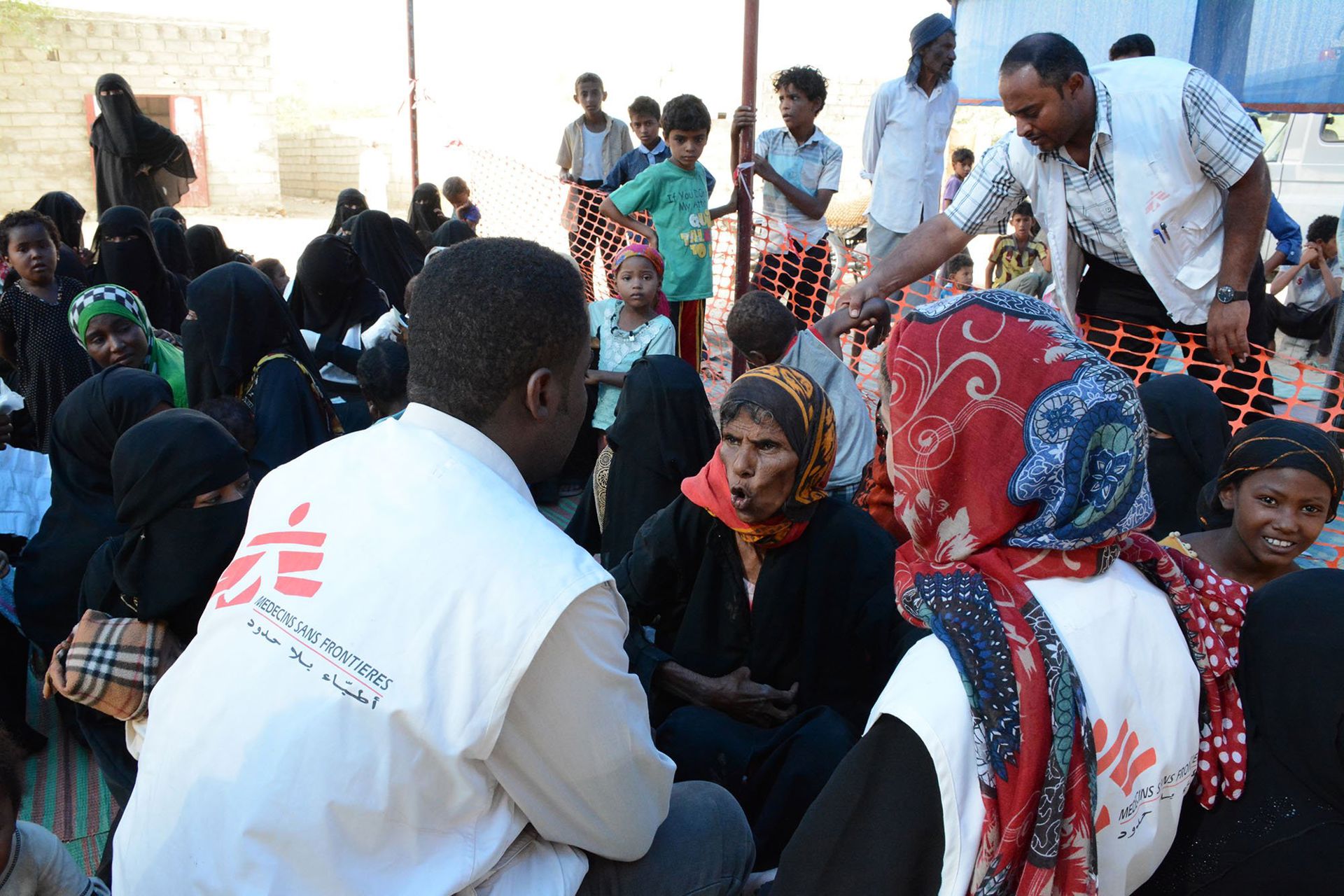
Waiting area in a mobile clinic run by MSF in Al Khamees health centre. According to the rapid assessment our teams conducted there last December, mortality was below emergency thresholds except for displaced children aged under five years old, which was slightly high. We have been providing health services twice a week in this area since February, with malnutrition being a major issue of concern especially during the malaria peak. © MSF
"I remembered the horrors of that day, and couldn’t help but start crying."
- Ahmad Qasem, emergency department supervisor
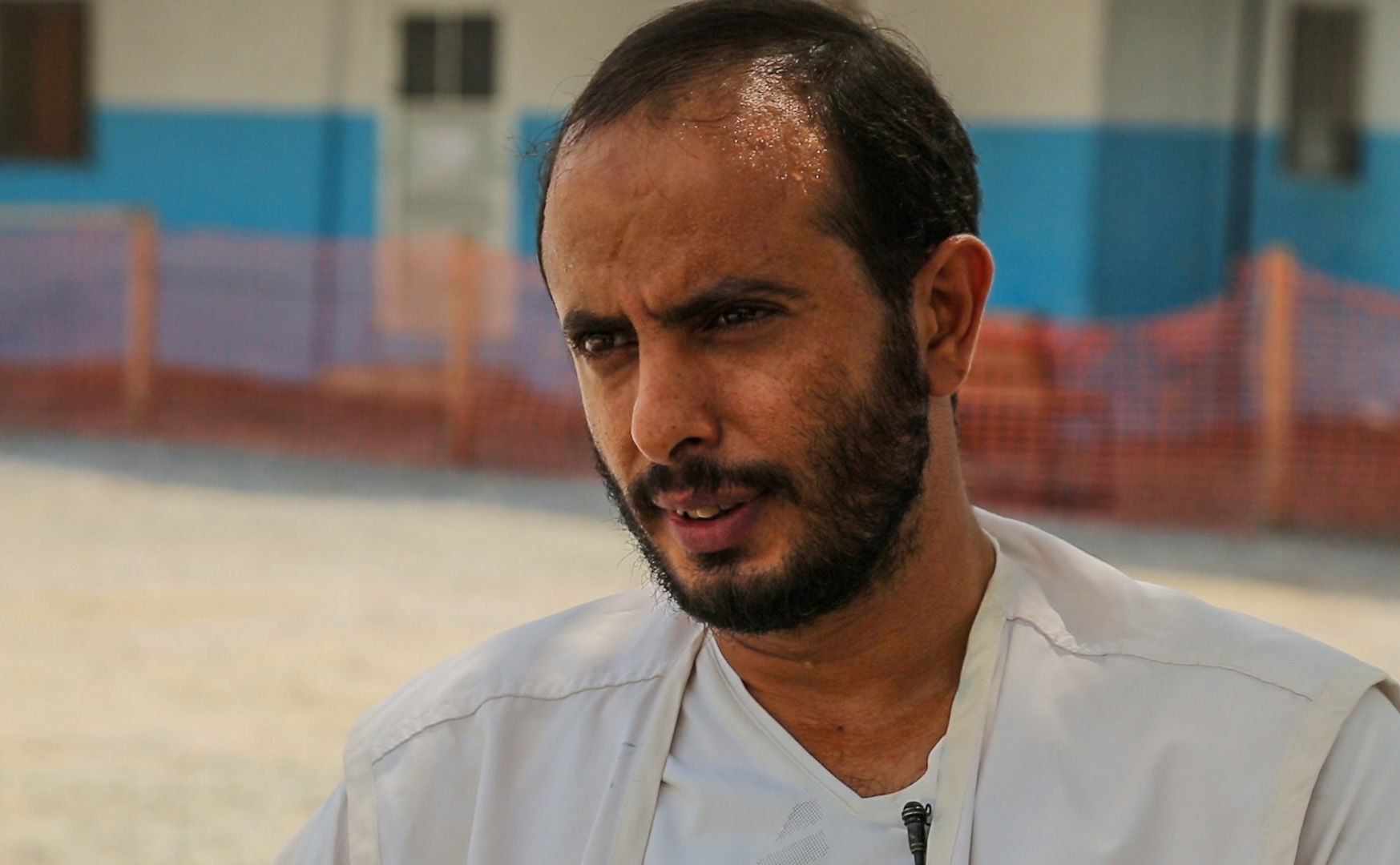
Ahmed went through the attack on Abs Hospital. He said until now people still panic from the sight of aircrafts. © MSF
Abs hospital is known as the only public hospital in the area. This is the only place where people can get free medical services. People of this area have no other place to go besides and their situation is really bad because of the war, immigration, and diseases which depend on the weather. We’ve witnessed many cases of malaria (recently), amounting to 120 cases a day. We also see respiratory infections and other common diseases. There are also car accidents and war injuries, as well as tribal conflicts. These people arrive here in bad shape. They barely have a roof over their heads and footwear to protect their feet. You’ll find a big family of 7 members living in a 3x3 meter tent. People before were living in their homes with dignity, having enough money to get through. However, some people have now lost their houses and money, some even lost part of their families. I remember a 2-year-old child who lost all his family in an airstrike, and was taken by another neighboring family. Now, this child is an orphan with no one to support him. He was lucky to find someone to rescue him. We hear stories like this a lot. You just don’t know what to do when you see this. When I saw these cases in this shape, I involuntarily cried.
Many cases have touched me, but maybe the most impactful one for me was when this hospital was bombed (in August 2016). I was working in the emergency department, and they notified us that an area was bombed and we should be ready to accept new cases. We didn’t hear the airstrike; we just felt a force pushing us to the ground. I fell down. This incident left a mark in me, and I immediately thought of my colleagues. I went to the emergency department and I found body parts, it was a massacre. I could not handle the view. I went back and told the others that all my colleagues were gone. Before the airstrike, locals used to feel safe here. When I returned back, I arrived at the emergency department, I remembered the horrors of that day, and couldn’t help but start crying. We gradually resumed work. Things weren’t the same in the beginning. People started panicking from the sight of aircrafts, or even when a door gets slammed hard in the hospital. Now, people feel a little safer, but they are still afraid. A few days ago, a big number of aircrafts were hovering around the area in the night, so some women left the nutrition department and tried to escape. We tried to calm them down.
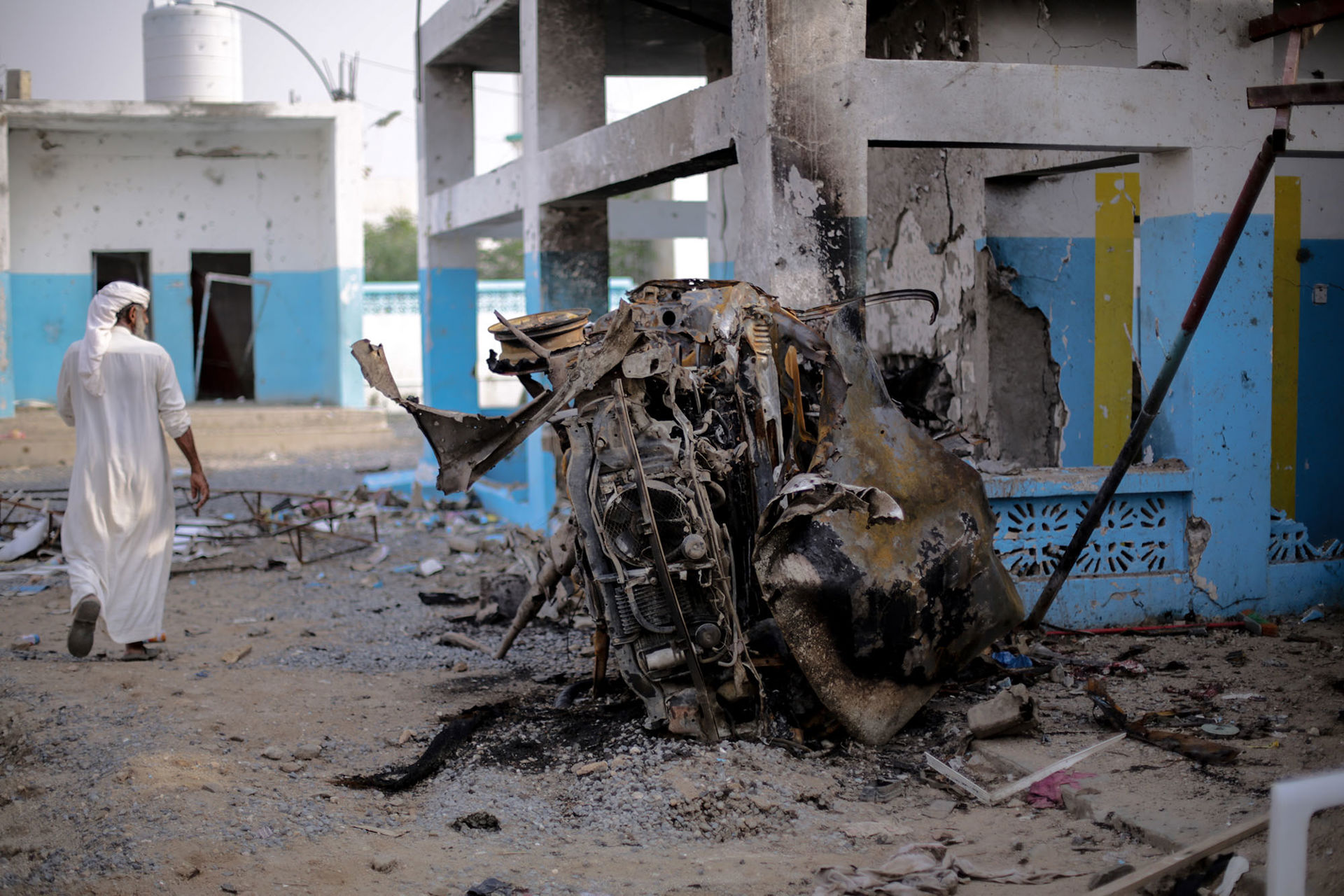
Abs Hosptial got hit in an airstrike by the coalition airstrike in august last year. A vehicle outside the emergency room was charred. The attack killed 19 and injured 24. © Rawan Shaif













